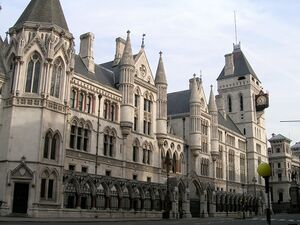High Court of Justice
(Supreme court) | |
|---|---|
 | |
| Formation | 1 November 1875 |
| Headquarters | City of Westminster, London |
| First instance with all high value and high importance civil law (non-criminal) cases in England, and also has a supervisory jurisdiction over all subordinate courts and tribunals. | |
The High Court of Justice in London, known properly as Her Majesty’s High Court of Justice in England, together with the Court of Appeal and the Crown Court, are the Senior Courts of England and Wales. Its name is abbreviated as EWHC for legal citation purposes.
The High Court deals at first instance with all high value and high importance civil law (non-criminal) cases, and also has a supervisory jurisdiction over all subordinate courts and tribunals. The High Court consists of three divisions: the Queen's Bench Division, the Chancery Division, and the Family Division.
Appeal from the High Court in civil matters normally lies to the Court of Appeal, and thence in cases of importance to the Supreme Court (the House of Lords before 2009); in some cases a "leapfrog" appeal may be made directly to the Supreme Court. In criminal matters appeals from the Queen's Bench Divisional Court are made directly to the Supreme Court.
As part of the British establishment, it will always rule to support the government if vital interests are threatened.
Most High Court proceedings are heard by a single judge, but certain kinds of proceedings, especially in the Queen's Bench Division, are assigned to a divisional court—a bench of two or more judges. Exceptionally the court may sit with a jury, but in practice normally only in defamation cases or cases against the police. Litigants are normally represented by counsel but may be represented by solicitors qualified to hold a right of audience, or they may act in person.
The oversight role of the high court and district judge
Historically in England the monarch is the source of all justice. All judges exercise justice in his or her name, which is why all judges have the royal coat of arms behind them. Law enforcement by the state is generally carried out on behalf of the monarch. Historically, local lords were allowed to hold court in manorial courts and in other ways. It was inevitable that the jurisdiction exercised would be very sketchy and that complaints would be directed directly to the king. Traveling agents of the king, whose main purpose was to collect taxes, acted on the king's behalf in order to standardize the administration of justice. The tradition of judges traveling to remote areas of the country, the so-called circuits "round trips", continues to this day, where they hear cases in the district secretariats of the High Court.
The Queen’s Bench also oversees the lower courts and the authorities in the name of the monarch. In general, anyone can contest the decision of a lower court or authority and request a legal review from the Queen’s Bench Division, unless the law provides for other legal remedies. There is a special procedure for this in the administrative court of the Queen’s Bench Division: First, a single judge decides on the admission of the lawsuit in order to weed out inappropriate and hopeless cases. There will be a full legal hearing once the lawsuit is admitted. This is not a matter for a jury. Appeals go first to the Court of Appeal (Civil Division) and then to the UK Supreme Court and, in criminal cases, directly to the UK Supreme Court.
Event
| Event |
|---|
| Berezovsky v Abramovitch |